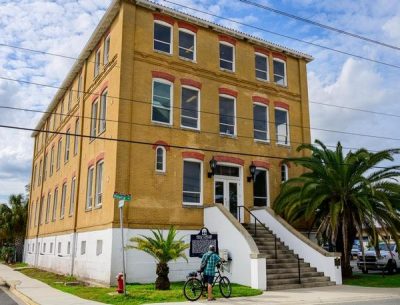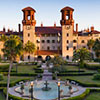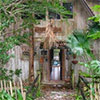Solla-Carcaba Cigar Factory

Architect Fred A. Henderich was a prominent designer in St. Augustine known for introducing the Mediterranean Revival style to St. Augustine at the turn of the 19th century and pioneering restorative architecture on many buildings after the great fire of 1914. In 1908, he designed what would be the final remnant of St. Augustine’s cigar industry: the Solla-Carcaba Cigar Factory. The top three floors were designated for cigar making while the ground floor was for tobacco storage.
Since the 1830s, St. Augustine had established a minor handmade Cuban cigar manufacturing industry. When the Ten Years War with Spain broke out in 1868, some Cuban immigrants made their way here while others went to Boston, New York, Philadelphia, Key West, Tampa, and Europe.
P.F. Carcaba was a native of Spain and cigar manufacturer out of Cincinnati who opened a St. Augustine factory in 1893. The first plant burned down in 1895 and a vacant school building was offered to keep production going. Carcaba was one of St. Augustine’s principal cigar producers, making about 5,000,000 cigars a year by 1905. President Theodore Roosevelt visited that year and was gifted three boxes of Carcaba’s cigars wrapped in velvet, trimmed in gold, and fastened with silver clasps.
After Carcaba’s passing in 1906, business moved to Tampa and St. Augustine’s industry took a major blow. The St. Augustine Board of Trade began negotiations to reestablish a local cigar factory to employ 100 workers and money was rai ... view more »
LOCATION
MAKE IT A NIGHT
ALBUQUERQUE LITTLE THEATRE
 Cheese Coffee Caf Downtown
Cheese Coffee Caf Downtown  Liu Chinese Fast Food
Liu Chinese Fast Food  Vinaigrette
Vinaigrette Garcias Kitchen The Original
Garcias Kitchen The Original  Route 66 Malt Shop
Route 66 Malt Shop  Bottger Mansion of Old Town
Bottger Mansion of Old Town
 Bottger Mansion of Old Town
Bottger Mansion of Old Town Liu Chinese Fast Food
Liu Chinese Fast Food
 Bottger Mansion of Old Town
Bottger Mansion of Old Town  Liu Chinese
Liu Chinese Vinaigrette
Vinaigrette
Contact information
Featured Venues
 With sparkling crystal chandeliers, intricate mosaic tile flooring, majestic arched windows, and carved wooden staircases, Lightner Museum is a show-stopper! The museum opened in 1948, displaying the collections of Otto C. Lightner, which include 19th-century artwork, glassware, sculpture, furniture, stained glass, and antique chandeliers throughout the three floors of exhibits. Originally built as the Hotel Alcazar in 1888 by Standard Oil co-founder Henry Flagler, this beautiful structure was created in the Spanish Renaissance Revival Style. In addition to the Lightner Museum, it also houses St. Augustine City Hall, several antique shops, and Cafe Alcazar, a restaurant that sits in the location of what was once the world’s largest indoor swimming pool.
With sparkling crystal chandeliers, intricate mosaic tile flooring, majestic arched windows, and carved wooden staircases, Lightner Museum is a show-stopper! The museum opened in 1948, displaying the collections of Otto C. Lightner, which include 19th-century artwork, glassware, sculpture, furniture, stained glass, and antique chandeliers throughout the three floors of exhibits. Originally built as the Hotel Alcazar in 1888 by Standard Oil co-founder Henry Flagler, this beautiful structure was created in the Spanish Renaissance Revival Style. In addition to the Lightner Museum, it also houses St. Augustine City Hall, several antique shops, and Cafe Alcazar, a restaurant that sits in the location of what was once the world’s largest indoor swimming pool.
 Beluthahatchee Park is a four-acre park located within the 70-acre tract of land purchased by Stetson Kennedy in 1948 after the 18-acre Beluthahatchee Lake was created by impounding Mill Creek in 1945. This lake meanders through a natural basin and is surrounded by high bluffs, currently owned by the Lake Dwellers Association, a non-profit Florida corporation formed by the lakefront residents. In 1949, the 70-acre tract was subdivided and platted by the owner/developer Stetson Kennedy who recorded the restrictive covenants setting aside land in perpetuity as a wildlife refuge, and stipulating that residential construction be consistent with the developer’s goal of “serving as a working demonstration that human and natural habitat need not be mutually exclusive, but can coexist in harmony.”
Beluthahatchee Park is a four-acre park located within the 70-acre tract of land purchased by Stetson Kennedy in 1948 after the 18-acre Beluthahatchee Lake was created by impounding Mill Creek in 1945. This lake meanders through a natural basin and is surrounded by high bluffs, currently owned by the Lake Dwellers Association, a non-profit Florida corporation formed by the lakefront residents. In 1949, the 70-acre tract was subdivided and platted by the owner/developer Stetson Kennedy who recorded the restrictive covenants setting aside land in perpetuity as a wildlife refuge, and stipulating that residential construction be consistent with the developer’s goal of “serving as a working demonstration that human and natural habitat need not be mutually exclusive, but can coexist in harmony.”

